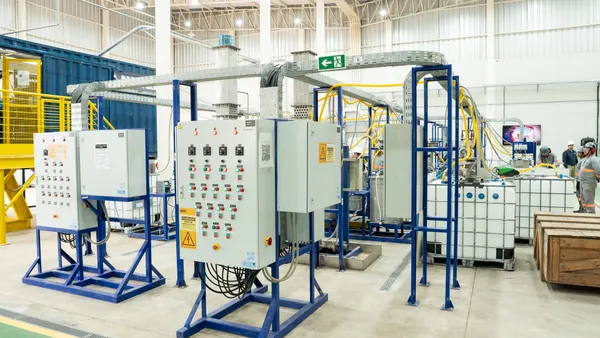Dive Brief:
- Prologis CFO Tim Arndt this week detailed a stark shift in the industrial real estate giant’s outlook after April 2, when President Donald Trump fully acted on his longstanding pledge to enact global tariffs, noting in a Wednesday earnings call with analysts that “even with the pause in some tariffs or resolution of others, customers simply lack a steady backdrop upon which to plan their businesses.”
- Arndt said the tariff actions “clearly went beyond our early predictions, making the environment less certain.” The company saw a post-election uptick in property leasing hold steady through a “very strong” first quarter, he said. But in the past two weeks, even as the company signed about 80 leases involving more than 6 million square feet, volume fell 20% from its normal pace, Arndt said.
- Painting a mixed picture of potential fallout from tariffs with some potential benefits for the company, Arndt said he expects that demand for warehouse space will rise as policy instability disrupts global supply chains. “First, a disconnected world will require more warehouse space not less,” Arndt said according to a transcript of the call. “Second, the current environment is an endorsement of our longstanding strategy to invest in markets where goods are consumed, not where they're produced.”
Dive Insight:
Arndt’s comments came as the San Francisco-based Prologis’s net earnings attributable to common shareholders ticked up to $592 million in Q1, compared to $584 million in the year-earlier period. The average occupancy of its owned and managed properties stood at 94.9%, down from 96.8% in the year-earlier period.
In a Wednesday note, JPMorgan analysts, led by Michael Mueller, wrote Prologis’s core funds from operations of $1.42 a share were above Bloomberg’s consensus expectation of $1.38 and also stated it was surprising that management maintained its core FFO outlook for 2025.
Arndt said on the call that the company’s first quarter results would normally have required tightening and increasing guidance. But due to the tariffs, the company instead opted to hold most areas of guidance unchanged, with the exception of capital deployment.
“Prior to April 2, industrial fundamentals were improving, and had it not been for the recent uncertainty from global tariffs and their downstream impacts, we would have raised our expectations for 2025,” he said. “Instead, we are electing to maintain earnings guidance as there are no policy conclusions right now to plan differently and our severe stress test to core FFO supports the existing range.”
The company held its 2025 guidance for net earnings attributable to common shareholders at between $3.45 to $3.70 but lowered its development start guidance to a range of $1.5 billion to $2 billion from a range of $2.25 billion to $2.75 billion. The change reflects the company’s expectation of reduced speculative development.
In setting the scene for the disruption in the market since April 2, Arndt also said the company has been in touch with more than 300 customers, noting that many of them are acting quickly to manage the tariff volatility by accelerating and re-routing shipments and looking for overflow space along with “short-term flexibility” while also evaluating free trade zones.
Detailing some of the tariff’s expected impacts, he said the company anticipates that inventory levels will increase, e-commerce will take a bigger share of transactions and markets outside the U.S., such as Canada, India and Brazil, will benefit. But Arndt cautioned that uncertainty is high.
“Let's be clear, the range of outcomes is wide. We see potential for recession, inflation, or possibly both. And let's also not dismiss the potential for a quick resolution,” he said, expressing confidence that Prologis is “designed to weather any environment” with its global footprint, diverse tenants and strong balance sheet.














